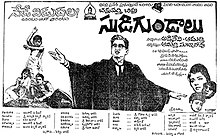Sudigundalu
Sudigundalu (transl. Whirlpools) is a 1968 Telugu-language philosophical film, produced by Akkineni Nageswara Rao, Adurthi Subba Rao under the Chakravarthy Chitra banner and directed by Adurthi Subba Rao. It stars Akkineni Nageswara Rao in the lead role and music composed by K. V. Mahadevan. The film has garnered the National Film Award for Best Feature Film in Telugu, The Nandi Award for Best Feature Film, and the Filmfare Award for Best Film - Telugu.[1][2] The film marked the debut of Akkineni Nagarjuna as child artist in a cameo.[3][4] The cult classic film was screened at the Tashkent Film Festival, and the International Film Festival of India.[5]
| Sudigundalu | |
|---|---|
 Theatrical release poster | |
| Directed by | Adurthi Subba Rao |
| Produced by | Adurthi Subba Rao Akkineni Nageswara Rao |
| Written by | N. R. Nandi (dialogues) |
| Screenplay by | K. Vishwanath |
| Story by | B. S. Thapa |
| Starring | Akkineni Nageswara Rao |
| Music by | K. V. Mahadevan |
| Cinematography | K. S. Ramakrishna |
| Edited by | T. Krishna |
Production company | Chakravarthy Chitra |
Release date | 1968 |
Running time | 136 mins |
| Country | India |
| Language | Telugu |
Plot
Justice Chandra Shekaram (Akkineni Nageswara Rao) is the very kind & noble person who gives shelter to the families of the criminals whom he has convicted. All of them live like a family and rears Chandra Shekaram's only son Raja (Master Raja) who is motherless with love & affection. One day Raja goes missing when everyone becomes panic, next day, unexpectedly, he is found dead. Police make a serious investigation and finds out that two youth Vikram Kumar (Vijayachander) & Sandhya Rani (Prasanna Rani) children of big shots of high society slaughtered Raja for fun. Here Mr. Moneybags try their level best to acquit them using their money & power but fails. At this point in time, Chandra Shekaram wears the pleader's shoes appears in the favor of the young culprits to bring out the real motive of the murder which shocks the entire court. Now Chandra Shekaram proves that these children become spoiled-brats due to lack & improper parental care and the argument unites with cultural deviations which our country is going to face in the future generation. Ultimately, he affirms that parents should play a key role in raising the children as responsible citizens. In the end, the court changes its judgment when Chandra Shekharam breathes his last in the court hall.
Cast
- Akkineni Nageshwara Rao as Judge Chandrasekharam
- Master Raja as Raja
- Gummadi as Public Prosecutor
- Ram Mohan as Police Inspector
- Sakshi Ranga Rao as Venkatappaiah
- Mada as Driver John Maridaiah
- Venkateswara Rao as Paanakaala Rao
- P. Koteswara Rao as Koteswara Rao
- Vijayachander as Vikram Kumar
- Pushpakumari as Rathamma
- Sukanya as Pankajam
- Sandhya Rani as Seeta
- Meena Kumari
- Sasikala as Sasikala
- Prasanna Rani as Sandhya Rani
- Master Akkineni Venkat as Cameo
- Master Akkineni Nagarjuna as Cameo (debut)
Crew
- Art: G. V .Subba Rao
- Choreography: Venu Gopal
- Dialogues: N. R. Nandi
- Lyrics: Dasaradhi
- Playback: Ghantasala, P. Susheela, Vasantha
- Music: K. V. Mahadevan
- Story: B. S. Thapa
- Screenplay: K. Viswanath
- Editing: T. Krishna
- Cinematography: K. S. Ramakrishna Rao
- Producer: Akkineni Nageswara Rao, Adurthi Subba Rao
- Director: Adurthi Subba Rao
- Banner: Chakravarthi Chitra
- Release Date: 1968
Soundtrack
| Sudigundalu | |
|---|---|
| Film score by | |
| Released | 1968 |
| Genre | Soundtrack |
| Length | 11:45 |
| Producer | K. V. Mahadevan |
Music composed by K. V. Mahadevan. The music released on Audio Company.
| S. No | Song Title | Lyrics | Singers | length |
|---|---|---|---|---|
| 1 | "Vinara Sodara" | Dasaradhi | Ghantasala, P. Susheela, Vasantha | 11:45 |
Awards
- Filmfare Best Film Award (Telugu)
References
- "15th National Film Awards" (PDF). Directorate of Film Festivals. Retrieved 21 September 2011.
- "Film producer passes away".
- "Sudigundaalu". 1 January 2000 – via IMDb.
- "Telugu cinema's second gen actors remember ANR - Times of India".
- Collections. Update Video Publication. 1991. p. 387.